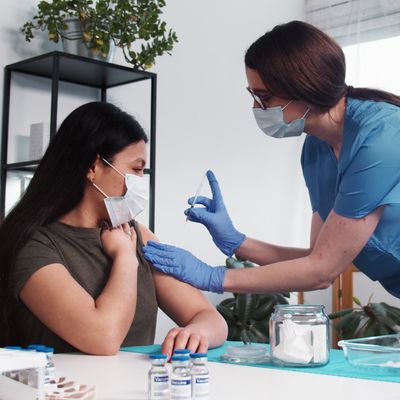
When federal health officials and the CDC decided to pause distribution of the Johnson & Johnson COVID-19 vaccine for ten days earlier this month, after several women developed a rare blood-clot disorder within two weeks of vaccination, some Americans expressed concern about potential effects the vaccine might have on women’s health. Others pointed out that birth control carries a far higher risk of blood clotting and is nonetheless recommended for contraception and numerous health conditions.
While some of these fears were founded — the blood-clot disorder, while extremely rare, could be fatal — some were not. Vaccines and conspiracies tend to go hand in hand, and this one is no different. Naomi Wolf, for instance, tweeted that she’d seen “hundreds” of reports of women experiencing irregular menstruation as a result of being near vaccinated women. Others, including Oprah-sanctioned influencer Christiane Northrup, have suggested vaccination could cause miscarriage or infertility. Here’s what medical experts say about these claims.
Is birth control riskier than the COVID-19 vaccine?
While countless women have pointed out that the birth-control pill carries a relatively higher risk of blood-clotting complications compared to the Johnson & Johnson vaccine, the comparison is somewhat misleading, says Rashmi Kudesia, a reproductive endocrinology and infertility specialist and medical advisor for SimpleHealth. First of all, not every oral contraceptive presents an equal risk — progesterone-only pills carry a “negligible risk,” says Kudesia, and are recommended to people with a family history of blood clotting. Most birth-control pills do contain estrogen, and for those, the risk of clotting is roughly five cases per 10,000 women-years (meaning women taking birth control over time), which is still very low.
The type of clotting seen as a side effect of birth control is also completely different from what we saw with the J&J vaccine, says Kudesia. “What we typically see with birth control is deep vein thrombosis, which is a clot that forms inside of the legs. The symptoms for DVT are quite a bit easier to spot” than those associated with the vaccine (which, again, are exceedingly rare). This context is not intended to make the J&J vaccine sound scarier than it is, but to say that birth control is also very safe. The risk of blood clotting during pregnancy is also much higher than it is on birth control, says Kudesia. “It also bears stating that the risk of blood clots due to getting COVID is also much higher than we’ve seen with the vaccination,” she adds.
Will the COVID-19 vaccine affect my period?
It’s certainly possible that the vaccine might impact your menstrual cycle, though there’s no reason to be alarmed, says Jen Gunter, an OB/GYN and author of The Vagina Bible. Gunter says she’s seen many reports of women experiencing altered periods after getting the vaccine, but adds several caveats worth considering: “People who are paying more attention to their periods may be people who pay more attention to symptoms post-vaccination. It could be stress — the relief of finally getting vaccinated.”
Because the lining of one’s uterus — the endometrium — is part of the immune system, Gunter says it’s also plausible that the vaccine could prompt menstrual irregularity as the body works to develop an immune response to the virus. “Just like if you get a fever after a vaccine, you don’t become permanently hot, having a temporary menstrual irregularity post-vaccine isn’t going to permanently affect your menstrual cycle,” says Gunter. (Anecdotally, I got my period four days early shortly after my second dose of the vaccine, but in every other respect it was normal.)
As for that Naomi Wolf theory, Gunter finds it self-evidently ludicrous. The idea that someone else’s vaccination status could affect our menstruation “ties into the myth of period syncing, which is a myth,” she says. “Nobody’s hormones are uniquely powerful enough that they can drag someone else into their menstrual cycle.”
Will the COVID-19 vaccine affect my fertility?
The notion that vaccines can render women infertile is a long-standing myth promoted by anti-vaxx groups, says Gunter — this is only the latest rendition. Public-health officials say they’ve seen no evidence to support this theory, and it’s something they watch closely. “If someone is actively trying to conceive and they get the vaccination, their cycle may shift, making it slightly harder to get pregnant at that time,” says Kudesia. “If someone were to get pregnant at that time, we have seen no risks to those pregnancies. That’s being tracked rigorously.”
Gunter points to the Johnson & Johnson vaccine pause as evidence that our public-health system is closely monitoring patients for potential side effects and will act quickly should any arise. “The last time I checked, [the CDC] is closely tracking about 4,500 people who were vaccinated during pregnancy,” she says. “They’re following this closely, and what we know so far is there’s no difference in the background rates of bad outcomes. What we do know causes bad outcomes is COVID.”





